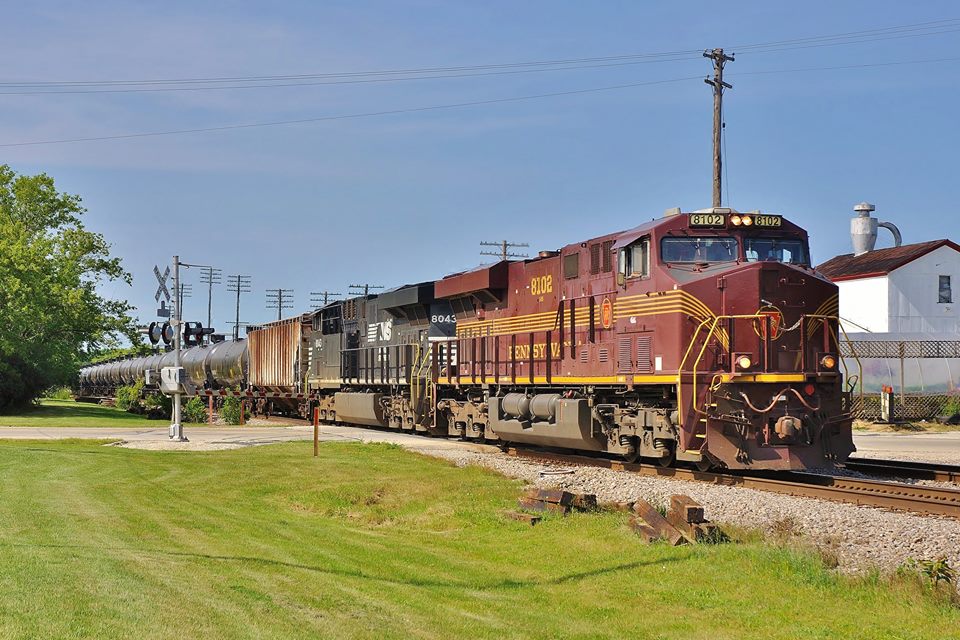
A Maryland court ruling against efforts by Norfolk Southern and CSX Transportation to keep information about oil movements like this NS train seen in Wisconsin less public may mean increased scrutiny and cost for shippers and carries alike. (image © 7/2015 by Nikki Burgess; used with permission)
The outcome of a recently decided court case in Maryland has the Class One railroads pondering their next move as regards keeping movement and other logistics information confidential when it comes to what the federal government has now classified as “high hazard” flammable liquids trains.
On August 17th City of Baltimore Circuit Court Judge Lawrence P. Fletcher-Hill ruled against efforts by CSX Transportation and Norfolk Southern Railway to block the Maryland Department of the Environment from releasing what the railroads categorized as business sensitive data. Under recently imposed federal rules, railroads are required to report such information to state and local government jurisdictions through which “high hazard” trains do or may pass. This information pertains to flammable liquid-carrying trains and includes:
- Routings for such trains
- Descriptions of cargo; specifically, the flammable liquid in question
- Number of such movements
- Emergency Contact information
The railroads argued that such information was a. confidential business data that would be anti-competitive if released, and b. that such data might prove a security list if it were made public. In his ruling Judge Fletcher dismissed such concerns. At press time the railroads had not indicated their next move; given their federal prerogatives under the Interstate Commerce Act and their federal charters, it seems unlikely that they will not appeal to federal authorities. Action on the case seems unlikely to end in Baltimore.
What does this mean to shippers of such products?
It is no surprise to them that such shipments draw often-strong opposition. This arises from two sources. It comes from local residents along such routes that may be fearful of accidents—the so-called “NIMBY” effect, now magnified given the spate of derailments and fires associated with rail shipments of oil since 2013. This sort of opposition is often spotty and easier for shippers and carriers to overcome through public outreach and education than the other major source; environmental groups who simply oppose any use of the oil in the first place, usually due to climate change concerns, and would prefer it to stay in the ground. These groups have found fertile ground in creating additional angst among online communities along the railroad—sowing fear, if you will, over what might happen, despite the overwhelming statistical evidence that rail movements are safe; safer, certainly, than a corresponding number of road shipments, and getting safer. Many of these groups have extremely effective publicity arms and find ready friends in large segments of the media, whose now-routine categorizations of the rail shipments as “bomb trains” should indicate to even a casual observer that a certain bias towards a negative portrayal of the shipments exists.
Increased scrutiny?
Given the judge’s ruling, shipper and carriers should be prepared to face increased scrutiny for their shipments. An elevated awareness among a population that in general has minimal understanding of hazardous materials or the risk management decisions involved in selecting their transport mode will probably not make shipping such products easier or less expensive. For one thing, insurance companies that underwrite these services are often responsive to public unease about such issues. That could certainly be a cost driver. Public anxiety may also drive increased political responses to ban or alter the terms under which such transport can even occur—at any cost. If the ruling stands, and by its precedent the impact spreads across the national rail network, oil by rail may become a battleground issue elsewhere than just in Maryland.
Labelmaster is a full service provider of goods and services for the Hazardous Materials and Dangerous Goods professional, shippers, transport operators, and EH&S providers. See our full line of solutions at www.labelmaster.com.


